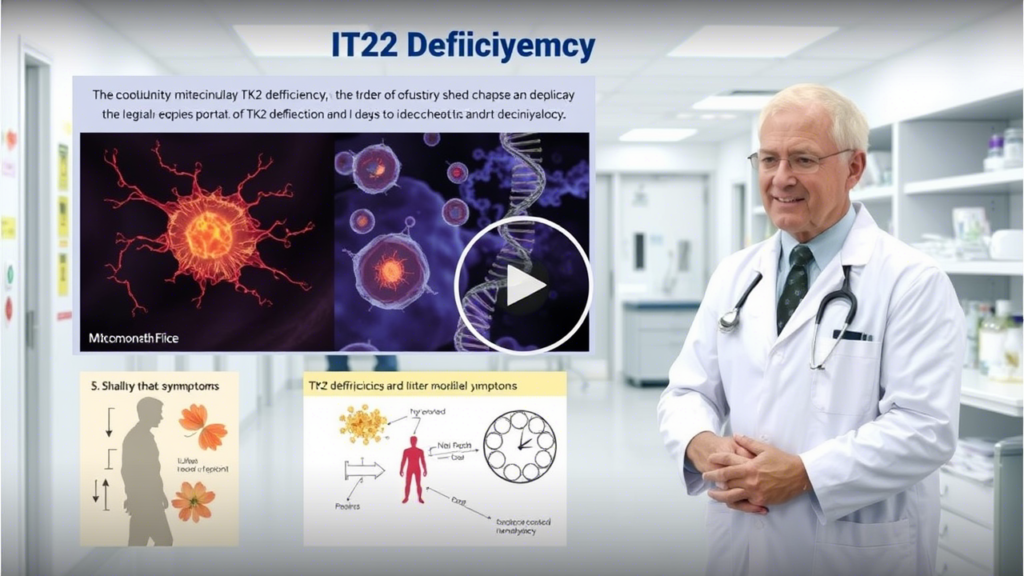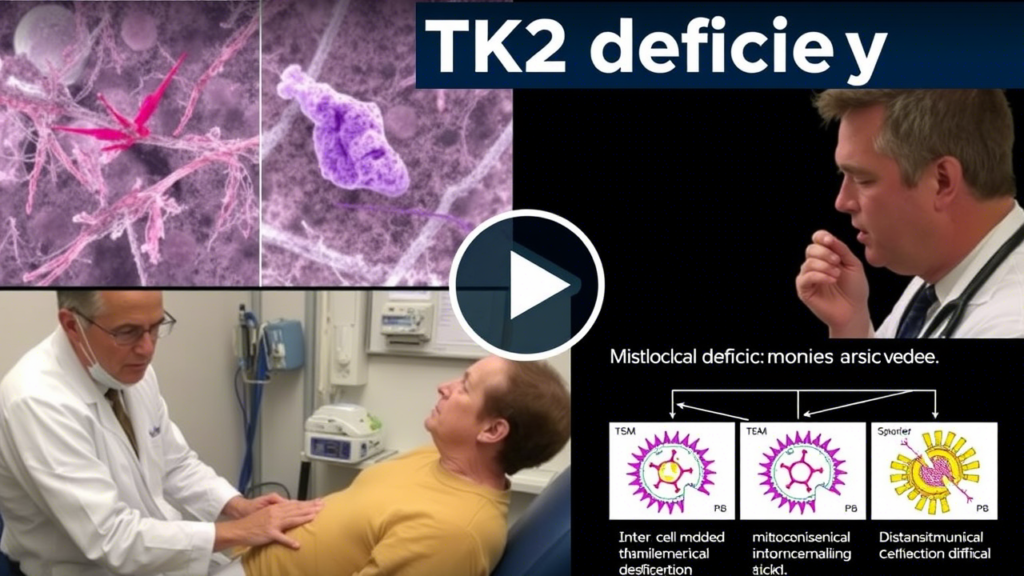What is TK2 Deficiency?
Thymidine kinase 2 deficiency, also known as TK2d, is a rare and potentially life-threatening genetic mitochondrial disorder. It’s caused by mutations in the TK2 gene, which plays a crucial role in mitochondrial function, specifically in the synthesis of nucleotides required for DNA repair. Without these necessary components, the mitochondria, which are the energy-producing powerhouses of cells, start to fail. This leads to widespread muscle weakness and can affect vital functions like walking, eating, and even breathing.
The Role of Mitochondria in TK2 Deficiency
Mitochondria are responsible for producing energy in the form of adenosine triphosphate (ATP). In people with TK2d, the malfunctioning mitochondria struggle to generate sufficient ATP. This results in energy depletion and an inability to repair DNA in muscle cells, leading to progressive muscle weakness (myopathy). Over time, this muscle weakness worsens, severely affecting the patient’s quality of life.
Symptoms of TK2 Deficiency
Individuals with TK2 deficiency experience a variety of symptoms, which typically manifest in childhood or adolescence, though it can present at any age. Key symptoms include:
- Progressive Muscle Weakness: A hallmark of TK2d, this weakness can interfere with basic movements and activities, such as walking, feeding, and even breathing.
- Difficulty Walking and Mobility Issues: As the disease advances, many individuals with TK2d may lose the ability to walk independently.
- Respiratory Problems: Due to weakening muscles, individuals may have difficulty breathing, requiring mechanical support.
- Feeding Difficulties: Muscle weakness can also affect the muscles used for swallowing, leading to feeding challenges.
- Cardiac Complications: In some cases, cardiac muscle is also affected, which can lead to life-threatening complications.
How is TK2 Deficiency Diagnosed?
Diagnosing TK2d involves a combination of clinical symptoms, genetic testing, and muscle biopsy. Genetic testing can confirm the presence of mutations in the TK2 gene, while a muscle biopsy can provide insight into the degree of mitochondrial dysfunction. Since TK2d is a rare disorder, it may be misdiagnosed initially, leading to delays in treatment.
Treatment and Management of TK2 Deficiency
Currently, there is no cure for TK2 deficiency, but treatment focuses on managing symptoms and slowing disease progression. The following approaches are often part of a comprehensive treatment plan:
- Physical Therapy: Helps maintain muscle function and improve mobility as much as possible.
- Respiratory Support: In severe cases, patients may require ventilatory assistance to help with breathing.
- Nutritional Support: As swallowing difficulties arise, feeding tubes may be necessary to ensure proper nutrition.
- Medications: Certain medications may help alleviate symptoms, although they do not address the root cause of the disease.
Prognosis and Life Expectancy
The prognosis for individuals with TK2 deficiency varies widely, depending on the age of onset, the severity of symptoms, and the degree of mitochondrial dysfunction. For many, the disease is progressive and life-limiting, but with appropriate care, some individuals can live longer, though their quality of life may be significantly impacted.

What Research is Being Done?
Researchers are continuously working to better understand TK2 deficiency and find more effective treatments. Ongoing studies aim to explore gene therapy and other potential interventions that could address the underlying mitochondrial dysfunction. Advances in mitochondrial medicine may offer hope for improved outcomes in the future.
Raising Awareness About TK2 Deficiency
Thymidine kinase 2 deficiency is a rare and debilitating mitochondrial disease that requires more awareness and understanding. While there is currently no cure, advancements in research and supportive care can help manage symptoms and improve the lives of those affected. By continuing to explore new treatment options, scientists and medical professionals are bringing hope to families facing this challenging disease.
The Genetic Basis of TK2 Deficiency
Thymidine kinase 2 (TK2) is an enzyme encoded by the TK2 gene, which is essential for maintaining mitochondrial DNA (mtDNA). Mitochondria are crucial for cellular energy production, and their health relies on the integrity of mtDNA. In people with TK2 deficiency, mutations in the TK2 gene impair the enzyme’s function, leading to an inability to produce the nucleotides needed for mitochondrial DNA repair. This disruption affects mitochondrial function, leading to a progressive loss of muscle strength and other associated symptoms.
Since mitochondria play a significant role in almost every cell, defects in mitochondrial DNA can lead to a wide range of issues, not only in muscles but also in other organs like the brain, heart, and kidneys. The progressive nature of the disease and the involvement of multiple systems make TK2d particularly challenging for both diagnosis and treatment.
The Importance of Early Diagnosis
TK2 deficiency is a progressive condition, and early intervention can play a crucial role in managing symptoms and improving quality of life. However, because it is so rare, many doctors may not immediately recognize the symptoms, which can lead to delays in diagnosis. Recognizing early signs such as unexplained muscle weakness, difficulty with movement, and respiratory issues can prompt further investigations into mitochondrial disorders.
The importance of genetic testing cannot be overstated. It can confirm the diagnosis of TK2 deficiency and help differentiate it from other conditions with similar symptoms, such as muscular dystrophy or other types of mitochondrial diseases. As the understanding of genetic disorders continues to grow, healthcare providers are becoming more adept at recognizing rare diseases like TK2d, leading to more accurate and quicker diagnoses.
Biography Table for TK2 Deficiency
| Category | Details |
|---|---|
| Condition Name | TK2 Deficiency (TK2d) |
| Genetic Cause | Mutations in the TK2 gene |
| Gene Function | Thymidine kinase 2 enzyme is essential for mitochondrial DNA repair |
| Inheritance Pattern | Autosomal recessive |
| Common Age of Onset | Childhood or adolescence, but can appear at any age |
| Symptoms | Progressive muscle weakness (myopathy), difficulty walking, respiratory issues, feeding difficulties |
| Diagnosis | Genetic testing and muscle biopsy |
| Current Treatments | Symptom management: physical therapy, respiratory support, nutritional support, medications |
| Prognosis | Progressive, life-limiting, varies by severity, dependent on age of onset and disease progression |
| Research Areas | Gene therapy, mitochondrial replacement therapy, drugs to improve mitochondrial function |
| Life Expectancy | Varies; many individuals have a shortened lifespan, depending on the severity of the condition |
| Known Risk Factors | Genetic mutations in the TK2 gene; family history of mitochondrial diseases |
| Support Resources | Patient advocacy groups, genetic counseling, and research initiatives on mitochondrial diseases |
Advances in Treatment: Hope for the Future
While there is no cure for TK2 deficiency at this time, promising research is underway to develop targeted therapies that could help manage the condition. One area of focus is gene therapy, which seeks to repair or replace defective genes within the mitochondria. If successful, gene therapy could potentially address the underlying cause of TK2 deficiency, offering patients a chance for improved mitochondrial function and muscle strength.
Additionally, scientists are exploring other strategies, such as mitochondrial replacement therapy and drugs that could enhance mitochondrial function or support the body in coping with the effects of mitochondrial dysfunction. While these treatments are still in the early stages, the ongoing research gives hope that, in the future, effective therapies may be developed.
Living with TK2 Deficiency
For individuals with TK2 deficiency and their families, managing the daily challenges of this progressive disease requires a multi-disciplinary approach. Support from healthcare professionals, including neurologists, cardiologists, respiratory specialists, and physical therapists, is essential. In addition, genetic counseling can help families understand the inheritance patterns of TK2 deficiency and make informed decisions about family planning.
For those living with TK2d, adaptive technologies such as wheelchairs, ventilators, and feeding tubes can significantly improve quality of life and ensure that patients are able to maintain independence for as long as possible. Though the disease is life-limiting, these interventions can help individuals continue to engage with their families and communities, providing comfort and support during difficult times.
Emotional and Psychological Impact
Living with a rare genetic disorder like TK2 deficiency not only affects physical health but also places a significant emotional and psychological burden on both patients and their families. Dealing with the uncertainty of a progressive illness can cause stress, anxiety, and depression. Support networks, including family, friends, and healthcare providers, play a critical role in providing emotional support and guidance.
In recent years, patient advocacy groups have emerged to offer support and raise awareness about mitochondrial diseases like TK2 deficiency. These organizations often provide resources, connect families facing similar challenges, and fund research initiatives. The sense of community and shared experience can provide comfort to those affected, ensuring they do not feel isolated in their struggles.
What Can You Do to Help?
Raising awareness about TK2 deficiency is critical, especially given its rarity. Educating healthcare professionals about the signs and symptoms of TK2d could help speed up diagnoses and improve patient outcomes. Supporting mitochondrial disease research, whether through donations or participation in clinical trials, can directly contribute to finding better treatments and ultimately a cure.
Additionally, fostering a greater understanding of mitochondrial disorders in the general public can help reduce stigma and increase empathy for those living with these conditions. With continued awareness and advocacy, there is hope that in the future, treatments for TK2 deficiency and other mitochondrial diseases will improve, offering patients a better quality of life.

Conclusion: A Future of Hope
Though TK2 deficiency remains a rare and challenging condition, advancements in medical research offer hope for the future. While the disease is progressive and life-limiting, early diagnosis and supportive care can make a significant difference in managing symptoms and improving quality of life. As research continues, new treatments and potential cures may emerge, providing a brighter future for individuals and families affected by TK2 deficiency. The journey is undoubtedly difficult, but with the continued dedication of the scientific community and patient advocacy groups, there is reason to remain hopeful.
